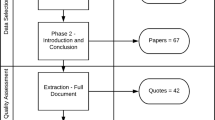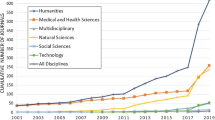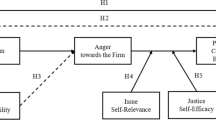Abstract
This article analyzes the effects of crowdfunding on the processes of generating value in Spanish publishing companies in order to understand the extent to which their use can be integrated and modify the existing publishing business models. Through a qualitative approach (case study), the type of publishing company that uses this formula will be determined, the nature of the publishing projects where it is applied and the type of crowdfunding that is most frequently used, to conclude that crowdfunding is used in Spain: (a) by small publishing companies, (b) in those publishing projects that exceed the capacity of a publishing organization to obtain the necessary resources through traditional channels, and (c) in its modality of non-monetary rewards.

Source: Magadán [18]

Source: own elaboration from Magadán [18]

Source: own elaboration starting from Magadán [18]

Source: own elaboration

Source: own elaboration
Similar content being viewed by others
References
Afy-Shararah M, Rich N. Operations flow effectiveness: a systems approach to measuring flow performance. Int J Oper Prod Manag. 2018;38(11):2096–123.
Ahlers GK, Cumming D, Günther C, Schweizer D. Signaling in equity crowdfunding. Entrep Theory Pract. 2015;39(4):955–80.
Bayus BL. Crowdsourcing new product ideas over time: an analysis of the dell ideastorm community. Manag Sci. 2012;59(1):226–44.
Belleflamme P, Lambert T, Schwienbacher A. Crowdfunding: tapping the right crowd. J Bus Ventur. 2014;29(5):585–609.
Bhargava A, Bafna A, Shabarisha N. A review on value chain analysis as a strategic cost management tool. Acc Financ Manag J. 2018;3(3):1386–93.
Burtch G, Ghose A, Wattal S. An empirical examination of the antecedents and consequences of contribution patterns in crowd-funded markets. Inf Syst Res. 2013;24(3):499–519.
Creswell J. Research design: qualitative, quantitative, and mixed methods approaches. Los Angeles: Sage; 2009.
Dollani A, Lerario A, Maiellaro N. Sustaining cultural and natural heritage in Albania. Sustainability. 2016;8(8):1–19.
Eisenhardt KM. Building theories from case study research. Acad Manag Rev. 1989;14:532–50.
Gamble JR, McAdam R, Brennan M. A rewarding experience? Exploring how crowdfunding is affecting music industry business models. J Bus Res. 2017;70:25–36.
Gerber EM, Hui J. Crowdfunding: motivations and deterrents for participation. ACM Trans Comput Hum Interact. 2013;20(6):1–32.
Gerring J, Cojocaru L. Selecting cases for intensive analysis: a diversity of goals and methods. Sociol Methods Res. 2016;45(3):392–423.
Holley AS (2016) We’ll want it when we say we want it: how the market speaks to the publishing industry via crowdfunding, and why publishers should listen. Book Publishing Final Research Paper. 15.
Howe J. Crowdsourcing. Why the power of the crowd is driving future of business. New York: Three Rivers Press; 2008.
Kappel T. Ex ante crowdfunding and the recording industry: a model for the US. Loyola Los Angel Entertain Law Rev. 2009;29(3):375–85.
Kim SG, Lee SG. Can crowd funding be the economic basis for the independence of small-scale culture & arts. Media Gend Cult. 2014;29:5–42.
Kuppuswamy V, Bayus BL. Crowdfunding creative ideas: the dynamics of project backers. In: de Cumming D, Hornuf L, editors. The economics of crowdfunding. London: Palgrave Macmillan, Cham; 2018.
Magadán M (2017) Technological change and innovation in the Spanish publishing industry: organizational effects. Doctoral dissertation, University of Oviedo, Oviedo.
Magadán M, Rivas J. Digitization and business models in the spanish publishing industry. Publ Res Q. 2018;34(3):333–46.
Magadán M, Rivas J. The impact of digitization on the Spanish publishing industry. Int J Book. 2018;16(2):1–18.
Mason J. Qualitative researching. London: Sage Publications; 2017.
Meyskens M, Bird L. Crowdfunding and value creation. Entrep Res J. 2015;5(2):155–66.
Mollick E. The dynamics of crowdfunding: an exploratory study. J Bus Ventur. 2014;29(1):1–16.
Moon Y, Hwang J. Crowdfunding as an alternative means for funding sustainable appropriate technology: acceptance determinants of backers. Sustainability. 2018;10(5):1–18.
Morduch J, Cull R. Microfinance and economic development. In: de Beck T, Levine R, editors. Handbook of finance and development. Cheltenham: Edward Elgar; 2017. p. 550–72. https://doi.org/10.4337/9781785360510.00030.
Moritz A, Block J, Lutz E. Investor communication in equity-based crowdfunding: a qualitative-empirical study. Qual Res Financ Mark. 2015;7(3):309–42.
Mustafa SE, Adnan HM. Crowdsourcing: a platform for crowd engagement in the publishing industry. Publ Res Q. 2017;33(3):283–96.
Nucciarelli A, et al. From value chains to technological platforms: the effects of crowdfunding in the digital game industry. J Bus Res. 2017;78:341–52.
Poetz MK, Schreier M. The value of crowdsourcing: can users really compete with professionals in generating new product ideas? J Prod Innov Manag. 2017;29(2):245–56.
Porter ME. Competitive advantage: creating a sustaining superior performance. New York: The Free Press; 1985.
Prahalad CK, Ramaswamy V. The future of competition: co-creating unique value with customers. Cambridge: Harvard Business School Press; 2004.
Schimming M (2015) Changing publisher-author relationships in the midst of developing crowd-funded publishing platforms. Book Publishing Final Research Paper. 8.
Schwienbacher A, Larralde B. Crowdfunding of entrepreneurial ventures. In: de Cumming D, editor. The oxford handbook of entrepreneurial finance. Oxford: Oxford University Press; 2012. p. 369–91.
Sedevich-Fons L. Linking strategic management accounting and quality management systems. Business Process Management Journal. 2018;24(6):1302–20.
Voigt M, de Bruijn W. Dutch publishing industry seeks startups through the renew the book competition. Publ Res Q. 2017;33(1):10–3.
Voss Ch, Tsikriktsis N, Frohlich M. Case research in operations management. Int J Oper Prod Manag. 2002;22:195–219.
Zott C, Amit R. Business model design: an activity system perspective. Long Range Plan. 2010;43(2–3):216–26.
Author information
Authors and Affiliations
Corresponding author
Additional information
Publisher's Note
Springer Nature remains neutral with regard to jurisdictional claims in published maps and institutional affiliations.
Rights and permissions
About this article
Cite this article
Magadán-Díaz, M., Rivas-García, J. Crowdfunding in the Spanish Publishing Industry. Pub Res Q 35, 187–200 (2019). https://doi.org/10.1007/s12109-019-09643-x
Published:
Issue Date:
DOI: https://doi.org/10.1007/s12109-019-09643-x




